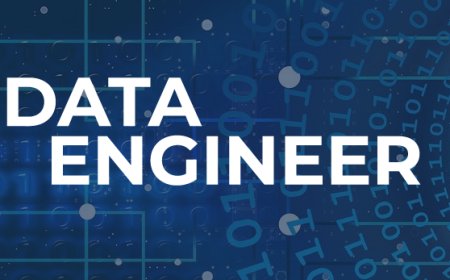Exploring the Intersection of Data Engineering and Artificial Intelligence
Explore the synergy of data engineering and artificial intelligence in this enlightening blog. Uncover the key components, real-world applications, and future prospects at the intersection of these dynamic fields.

In the evolving tech landscape, data has become the lifeblood of innovation, and artificial intelligence (AI) has emerged as the driving force behind transformative applications. At the heart of this technological revolution lies the fascinating intersection of data engineering and AI, where data's raw potential is harnessed, transformed, and deployed to fuel intelligent systems. This confluence is not just a trend but a strategic imperative for organizations seeking to leverage the power of data-driven insights and machine learning.
Foundations of Data Engineering and AI in Technology
"Foundations of Data Engineering and AI in Technology" is a pivotal concept that underpins the modern technological landscape. It encompasses the fundamental building blocks that power the integration of data engineering and artificial intelligence.
Data engineering involves the collection, transformation, and organization of data for analysis, enabling businesses to make informed decisions based on insights derived from large datasets. Simultaneously, artificial intelligence, or AI, refers to the development of intelligent systems that can learn, reason, and act autonomously.
These two disciplines play distinct yet interconnected roles in the tech industry. Data engineering forms the infrastructure, ensuring data is accessible and in the right format for AI algorithms. AI, on the other hand, utilizes this data to create intelligent models, automate tasks, and improve decision-making processes.
The intersection of data engineering and AI is driven by the increasing reliance on data-driven decision-making across sectors such as healthcare, finance, and marketing. As organizations seek to harness the power of data, understanding the foundations of data engineering and AI becomes critical for technological advancements and innovation.
Overcoming Challenges at the Intersection of Data Engineering and AI
Overcoming Challenges at the Intersection of Data Engineering and AI explores the intricate landscape where data engineering and artificial intelligence converge. When these two domains intersect, a host of challenges emerge, demanding innovative solutions. One primary challenge is the need for seamless integration of data engineering and AI to extract valuable insights. This entails harmonizing data pipelines, ensuring data quality, and optimizing data transformation processes.
Working with large datasets for AI applications introduces complexities in terms of storage, processing, and model training. These challenges necessitate scalable and efficient infrastructure and computational resources.
The data quality and the robustness of data pipelines are critical for the success of AI projects. Flawed data can lead to misleading AI outcomes. Ensuring high-quality, reliable data and well-structured pipelines is paramount.
professionals at the intersection of data engineering and AI play a vital role in devising strategies and solutions to address these challenges. By navigating these hurdles, organizations can harness the full potential of AI to make data-driven decisions and innovate effectively.
How the Intersection of Data Engineering and AI
The intersection of Data Engineering and Artificial Intelligence (AI) represents a crucial and dynamic area in the realm of technology and data science. It's the juncture where two fundamental fields meet and collaborate to drive innovation, decision-making, and efficiency in various industries. Here's a more in-depth explanation of this exciting topic:
Data Engineering
Data engineering is the discipline that focuses on the practical application of data collection, storage, processing, and analysis. It deals with the architecture, construction, and maintenance of systems for collecting, storing, and delivering data to decision-makers, data scientists, and AI models. Data engineers design and build data pipelines, ensuring that data is structured, accessible, and ready for analysis. They play a pivotal role in turning raw data into valuable insights and business intelligence.
Artificial Intelligence (AI)
AI, on the other hand, encompasses a range of technologies that allow machines to perform tasks that typically require human intelligence. This includes machine learning, deep learning, natural language processing, computer vision, and more. AI systems learn from data and make predictions, classify information, automate tasks, and provide recommendations. AI has applications across industries such as healthcare, finance, marketing, and manufacturing, among others.
Data for AI: AI models heavily rely on high-quality, well-organized data for training. Data engineers are responsible for collecting, cleaning, and structuring this data, making it suitable for AI applications. They must design data pipelines that ensure a continuous flow of data to AI systems.
Feature Engineering: Feature engineering is a critical component of AI model development. Data engineers often collaborate with data scientists to select and create relevant features that improve the performance of AI algorithms.
Data Quality: High-quality data is paramount for AI accuracy. Data engineers play a key role in maintaining data quality, ensuring it's free from errors, inconsistencies, and bias. They implement data validation and cleansing procedures.
Scalability: AI projects often require the processing of massive datasets. Data engineers design scalable data architectures that can handle large volumes of data efficiently.
Real-time Data: Some AI applications, like real-time recommendations or fraud detection, require real-time data processing. Data engineers build systems that can provide up-to-the-minute data to AI models.
Collaboration: Effective collaboration between data engineers, data scientists, and machine learning engineers is crucial. They must work together to understand the data requirements of AI models and create the infrastructure needed for successful model development and deployment.
Continuous Improvement: The intersection of data engineering and AI is not static. It involves a continuous process of improving data pipelines, refining AI models, and adapting to changing business needs and data sources.
Strategies for Harnessing Data Engineering in AI Integration
"Strategies for Harnessing Data Engineering in AI Integration" is a focused topic that delves into the methods and approaches that organizations can employ to successfully merge data engineering and artificial intelligence (AI) initiatives. This topic is crucial in today's tech landscape, as the effective integration of data engineering practices with AI is essential for achieving meaningful insights and optimal performance in AI applications.
Data Engineering in AI Integration: Data engineering encompasses the processes of collecting, storing, and transforming data into usable formats. When it comes to AI integration, data engineering plays a critical role in providing high-quality and well-prepared data for AI models to train on.
Data Preparation and Integration: Effective data preparation involves cleaning, structuring, and preprocessing data to make it suitable for AI model consumption. Data engineers are responsible for ensuring that the data used in AI projects is accurate, complete, and properly integrated from various sources.
Robust Data Pipelines: Data pipelines are the backbone of AI model training. Discussing best practices for building robust data pipelines is essential. This includes considerations for data ingestion, storage, ETL (Extract, Transform, Load) processes, and data quality checks.
Collaboration between Data Engineers, Data Scientists, and ML Engineers: Collaboration among these key roles is vital for the success of AI integration. Data engineers need to work closely with data scientists and machine learning engineers to understand the specific requirements of AI projects and deliver data that meets those needs.
Skills Development and Training: For professionals interested in the intersection of data engineering and AI, guidance on skill development and training is crucial. This involves learning about the tools, technologies, and best practices needed to excel in this dynamic field.
The intersection of data engineering and artificial intelligence represents a dynamic and promising frontier in the ever-evolving tech landscape. As organizations increasingly rely on data-driven decision-making and AI applications, the synergy between these domains is vital. By addressing the challenges, fostering collaboration, and acquiring the necessary skills, individuals and organizations can harness the full potential of data engineering and AI integration. This symbiotic relationship not only enhances the quality and efficiency of AI projects but also paves the way for groundbreaking innovations.










































